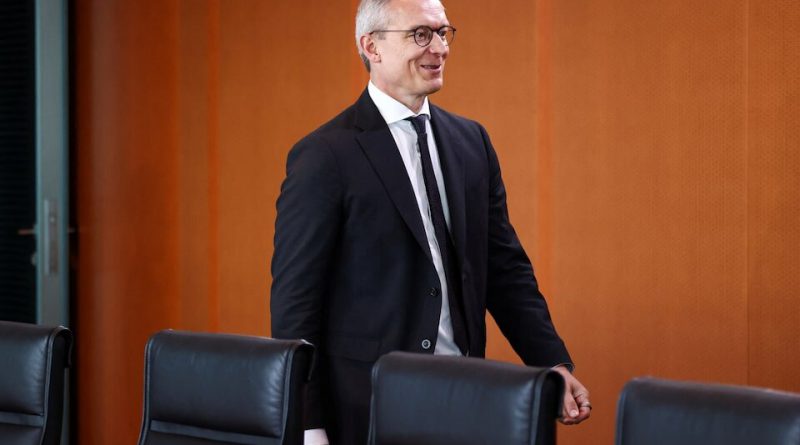Germany Leads the Charge for a Digitally Independent Europe — Without Shutting the World Out
Digital Minister Karsten Wildberger outlines Germany’s vision for digital sovereignty built on innovation, openness, and global collaboration — proving Europe can be both independent and interconnected.
In a strong and forward-looking statement, Germany’s Minister for Digitalization and State Modernization, Karsten Wildberger, emphasized that Europe’s pursuit of digital sovereignty is not about isolation or protectionism but about building confidence, capability, and cooperation in the global digital landscape.
Wildberger said Europe must develop its own digital infrastructure to reduce dependence on U.S. technology providers, while maintaining strong partnerships with them.
His message highlighted a vision of balance — one that strengthens Europe’s technological independence without sacrificing international collaboration.
A Vision for a Self-Reliant Digital Europe
Wildberger explained that achieving digital sovereignty means becoming active players, not passive consumers, in the global tech ecosystem.
“Europe needs to participate in this sector as players, not just as customers,” he said, calling for greater investment in local research, innovation, and data-driven enterprises.
The minister described the digital economy as a “huge growth market for technology, innovation, software, data, and artificial intelligence,” and encouraged European nations to harness their potential to compete globally.
He underscored that the goal was not to turn away from other markets but to ensure Europe could stand confidently on its own in key areas like AI, chip design, and cybersecurity.
European Tech Innovation Rising
Germany and the European Union have already made significant progress in nurturing homegrown innovation. Wildberger cited successful examples such as Mistral AI, DeepL, and Aleph Alpha — European companies that have become recognized names in artificial intelligence and language technology. These firms reflect Europe’s growing influence in sectors that were once dominated by American giants.
However, Wildberger also recognized that U.S. companies remain crucial partners on Europe’s digital journey. “Digital sovereignty doesn’t mean protectionism,” he said. “We want to and must be accessible for the global market.” His statement underscores that Europe’s approach is not one of exclusion, but of strengthening cooperation through equality and innovation.
Independence Built on Choice and Openness
Wildberger highlighted the importance of choice and flexibility in Europe’s digital framework. He explained that companies should be free to decide where their data is stored, who manages their infrastructure, and how they engage in global technology partnerships.
This approach ensures that European businesses are not locked into dependency but can instead operate with autonomy and security. Digital sovereignty, he emphasized, must empower companies to make independent decisions in a connected world — protecting sensitive data while remaining open to international collaboration.
Rethinking the Entire Supply Chain
True digital sovereignty, Wildberger said, goes beyond software or data storage. It requires rethinking the entire technological supply chain — from sourcing rare earth materials and designing chips to building secure servers, cables, and networks. By investing in these areas, Germany and the EU aim to strengthen Europe’s resilience and reduce vulnerabilities in an increasingly competitive global market.
His remarks reflect a strategic, long-term vision: one where Europe leads not by closing its borders but by deepening its capabilities and partnerships.
A Message of Cooperation and Confidence
Addressing concerns about potential disruptions in transatlantic cooperation, Wildberger expressed optimism that European and U.S. companies will continue working together. “American firms will always be interested in doing business abroad,” he said, emphasizing mutual benefit and shared innovation.
Many industry experts agree that Europe’s push for digital sovereignty does not threaten global ties but enhances them. By building stronger internal capacity, Europe can contribute more meaningfully to international research, regulation, and digital ethics — creating a healthier balance between regions.
Germany’s Leadership in the Digital Decade
Under Wildberger’s leadership, Germany is emerging as a key driver of Europe’s digital decade. From expanding high-speed connectivity and promoting AI ethics to investing in cloud infrastructure and cybersecurity, Germany’s efforts are shaping the foundation of a more secure, innovative, and self-reliant Europe.
Wildberger’s approach represents a new model of sovereignty — one that combines independence with openness, strength with partnership, and innovation with responsibility.
As Europe moves forward, this vision could define its role in the next era of global digital leadership.
The message from Berlin is clear: Europe’s digital future will be built not by withdrawing from the world, but by working confidently within it — as creators, collaborators, and global leaders.



